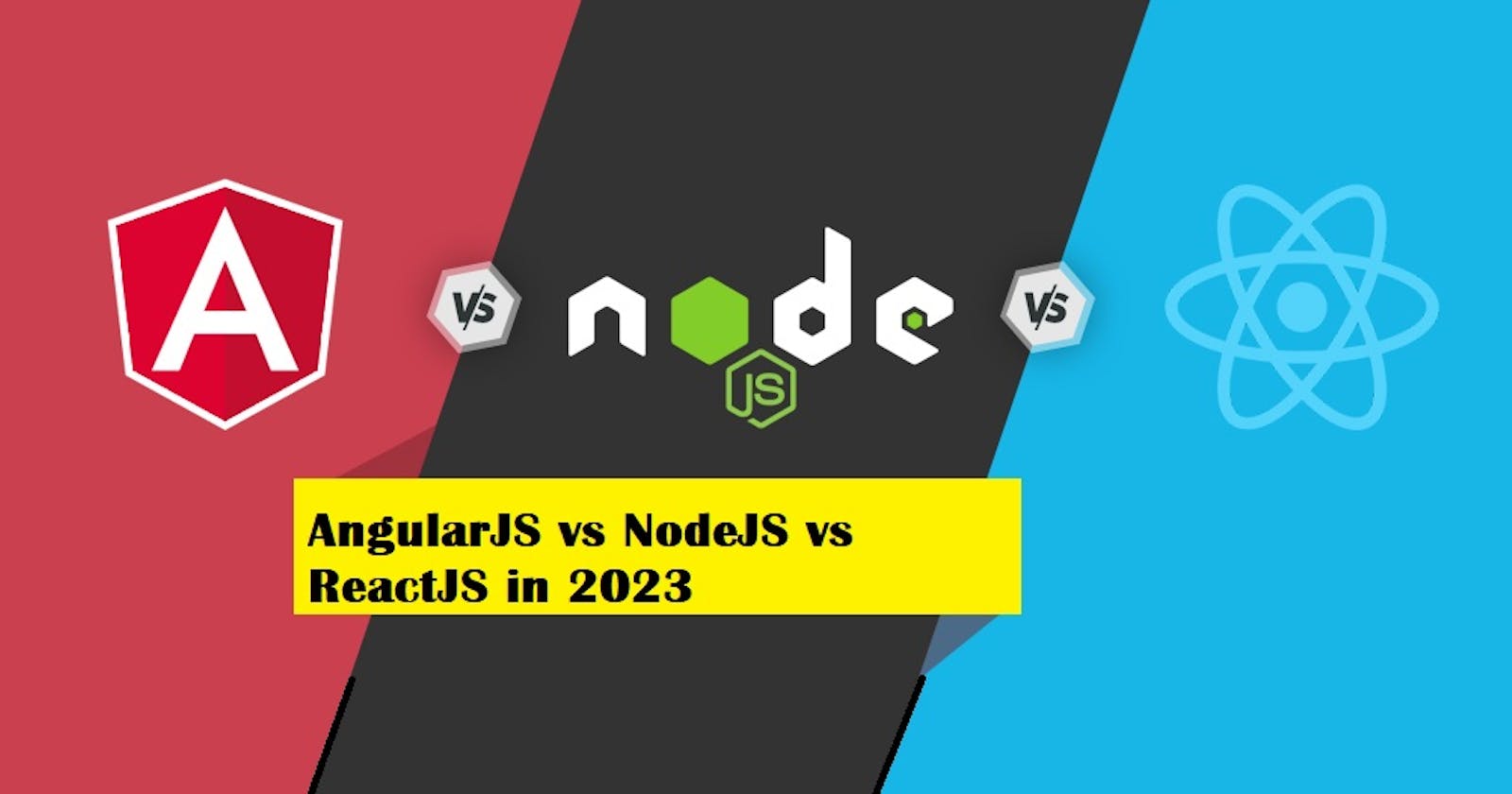In the dynamic world of web development, choosing the right technology stack is crucial. Three popular choices for building modern web applications are AngularJS, NodeJS, and ReactJS. In this guide, we'll delve into a comprehensive comparison of these technologies, taking into account their features, use cases, and advantages in the context of the year 2023.
AngularJS:
AngularJS, developed and maintained by Google, is a robust front-end framework for building dynamic and data-driven web applications. It boasts a powerful two-way data binding mechanism that simplifies handling complex user interfaces. AngularJS provides a complete solution, including routing, dependency injection, and testing support. However, its steep learning curve and verbosity might be considered drawbacks. In 2023, AngularJS continues to be a solid choice for large-scale applications with its mature ecosystem.
NodeJS:
NodeJS, powered by the V8 JavaScript engine, is an event-driven, non-blocking I/O runtime environment. It's mainly used for building server-side applications and APIs. Its asynchronous nature allows for high concurrency and efficiency. In 2023, NodeJS maintains its popularity due to its versatility and the vast selection of libraries available through the npm package manager. It's well-suited for real-time applications, microservices, and APIs.
ReactJS:
ReactJS, developed by Facebook, is a front-end library for building user interfaces. It follows a component-based architecture and excels at creating reusable UI components. React's virtual DOM efficiently updates only the necessary parts of the actual DOM, resulting in improved performance. React's popularity continues to soar in 2023, driven by its simplicity, flexibility, and active community. It's ideal for building interactive and responsive user interfaces.
Use Cases:
AngularJS: Well-suited for complex applications with extensive functionality and advanced data-binding needs. Great for enterprise-level applications.
NodeJS: Ideal for building fast and scalable server-side applications, real-time applications, and microservices.
ReactJS: Best for creating reusable UI components, building interactive web applications, and Single Page Applications (SPAs).
Advantages:
AngularJS: Comprehensive framework with a wide range of tools and features. Great for large-scale applications.
NodeJS: Non-blocking I/O for high concurrency, a vast library ecosystem, and efficient server-side development.
ReactJS: Declarative approach, reusable components, efficient virtual DOM rendering, and a strong community.
**
Hiring AngularJS, NodeJS, and ReactJS Developers in 2023: A Comprehensive Guide**
As the demand for web developers continues to rise, making the right choice between hiring AngularJS, NodeJS, or ReactJS developers in 2023 can greatly impact the success of your projects. Each technology has its unique strengths and use cases, and finding the right talent requires careful consideration. Here's a guide to help you navigate the hiring process effectively.
Identify Your Project Needs:
Before you begin the hiring process, clearly define your project's requirements. Determine whether you need front-end, back-end, or full-stack development. AngularJS, ReactJS, and NodeJS have different strengths, so align your needs with the technology that suits your project best.
Understand Skill Requirements:
AngularJS Developer: Look for expertise in the AngularJS framework, TypeScript, HTML, CSS, and familiarity with RxJS for handling asynchronous operations.
NodeJS Developer: Seek skills in JavaScript/TypeScript, Node.js runtime, and experience with backend frameworks like Express.js. Knowledge of APIs, databases, and asynchronous programming is crucial.
ReactJS Developer: Prioritize proficiency in JavaScript/TypeScript, React library, JSX syntax, state management with tools like Redux, and REST API integration.
Experience and Projects:
Examine candidates' portfolios to gauge their experience with projects similar to yours. Look for completed projects, code samples, and the complexity of applications they've worked on. Experienced developers are more likely to deliver high-quality solutions.
Problem-Solving and Communication:
Assess candidates' problem-solving abilities through technical interviews or coding challenges. Effective communication skills are crucial for collaborating with team members and understanding project requirements.
Community Involvement:
Active participation in the open-source community, contributions to forums, and engagement on platforms like GitHub showcase a developer's dedication to their craft.
Evaluate Soft Skills:
Apart from technical expertise, consider soft skills like teamwork, adaptability, and a willingness to learn. A developer who can effectively collaborate with your team and adapt to changing project needs is invaluable.
Technical Interviews:
Conduct technical interviews to evaluate candidates' coding skills, problem-solving approaches, and familiarity with the chosen technology stack. Pose real-world scenarios to gauge their ability to tackle challenges.
Cultural Fit:
Ensure that the developer's values align with your company culture. This fosters a positive work environment and enhances collaboration.
Remote Work Capability:
In 2023, remote work is more prevalent than ever. Assess a candidate's ability to work effectively in remote settings, including communication and time management skills.
Competitive Compensation:
Offer competitive compensation packages based on the developer's experience, skill set, and the technology stack they specialize in. Fair compensation attracts and retains top talent.
Hiring AngularJS, NodeJS, or ReactJS developers in 2023 involves a mix of technical assessment, soft skills evaluation, and cultural alignment. Understand your project needs, assess candidates' skills, experience, and problem-solving abilities, and consider factors like community involvement and remote work capabilities. By following this comprehensive guide, you'll be better equipped to assemble a talented and cohesive development team that will drive the success of your projects.
Conclusion:
In 2023, the choice between AngularJS, NodeJS, and ReactJS depends on your specific project requirements. AngularJS remains powerful for intricate front-end development, NodeJS is an excellent choice for server-side and real-time applications, while ReactJS continues to shine with its component-based architecture and streamlined UI development. When you hire reactjs developers, Hire node.js developers, or Hire angularjs developers, carefully evaluate your project's needs, team expertise, and scalability requirements to make an informed decision that aligns with the latest trends in the ever-evolving web development landscape.
